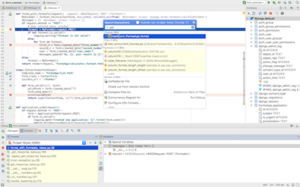PyCharm
PyCharm is an integrated development environment (IDE) used in computer programming, specifically for the Python language. It is developed by the Czech company JetBrains.[6] It provides code analysis, a graphical debugger, an integrated unit tester, integration with version control systems (VCSes), and supports web development with Django as well as Data Science with Anaconda.[7]
 | |
 | |
| Developer(s) | JetBrains |
|---|---|
| Initial release | 3 February 2010[1] |
| Stable release | |
| Written in | Java, Python |
| Operating system | Windows, macOS, Linux |
| Size | 174-270 MB |
| Type | Integrated development environment |
| License | Commercial, Freemium (open source parts are under Apache License) |
| Website | www |
 | |
| Developer(s) | JetBrains |
|---|---|
| Initial release | 30 October 2014[4] |
| Stable release | 2020.1.2 (Build: 201.7846.105)
/ 25 June 2020[5] |
| Written in | Java, Python |
| Operating system | Windows, macOS, Linux |
| Size | 150~176 MB |
| Type | Integrated development environment |
| License | Apache License |
| Website | www |
PyCharm is cross-platform, with Windows, macOS and Linux versions. The Community Edition is released under the Apache License,[8] and there is also Professional Edition with extra features – released under a proprietary license.
Features
- Coding assistance and analysis, with code completion, syntax and error highlighting, linter integration, and quick fixes
- Project and code navigation: specialized project views, file structure views and quick jumping between files, classes, methods and usages
- Python refactoring: includes rename, extract method, introduce variable, introduce constant, pull up, push down and others
- Support for web frameworks: Django, web2py and Flask [professional edition only] [9]
- Integrated Python debugger
- Integrated unit testing, with line-by-line code coverage
- Google App Engine Python development [professional edition only]
- Version control integration: unified user interface for Mercurial, Git, Subversion, Perforce and CVS with change lists and merge
- Support for scientific tools like matplotlib, numpy and scipy [professional edition only][10]
It competes mainly with a number of other Python-oriented IDEs, including Eclipse's PyDev, and the more broadly focused Komodo IDE.
Plugins
PyCharm provides an API so that developers can write their own plugins to extend PyCharm features. Several plugins from other JetBrains IDE also work with PyCharm. There are more than 1000 plugins which are compatible with PyCharm.[11]
History
The beta version was released in July 2010, with the 1.0 arriving 3 months later. Version 2.0 was released on 13 December 2011, version 3.0 on 24 September 2013, and version 4.0 on 19 November 2014.[12]
PyCharm Community Edition, the open source version of PyCharm, became available on 22 October 2013.[8]
Licensing
- PyCharm Professional Edition has several license options, which differ in their features,[13] price, and terms of use.[14]
- PyCharm Professional Edition is free for open source projects and for some educational uses.[14]
- An Academic license is discounted or free.[15][16]
- PyCharm Community Edition is distributed under Apache 2 license, with full source code available on GitHub.[17]
References
- "Jet brains Pycharm - New Python IDE by creators of IntelliJ - Hacker News". news.ycombinator.com.
- "Release: PyCharm 2020.1.3". JetBrains. 8 April 2020.
- https://blog.jetbrains.com/pycharm/2020/07/release-pycharm-2020-1-3/
- Filippov, Dmitry (30 October 2014). "JetBrains Debuts PyCharm Educational Edition".
- "Download PyCharm Edu", Jetbrains.com
- "JetBrains Strikes Python Developers with PyCharm 1.0 IDE". eWeek.
- Haagsman, Ernst (4 April 2019). "Collaboration with Anaconda, Inc". PyCharm Blog. Retrieved 26 May 2019.
- "PyCharm 3.0 Community Edition source code now available" 22 October 2013, Dmitry Jemerov, JetBrains blog
- "Full-stack Web Development - Features | PyCharm". JetBrains. Retrieved 2 January 2020.
- "Scientific & Data Science Tools - Features | PyCharm". JetBrains. Retrieved 2 January 2020.
- "PyCharm Professional - Plugins | JetBrains". JetBrains Plugin Repository. Retrieved 4 April 2019.
- Filippov, Dmitry (19 November 2014). "Announcing General Availability of PyCharm 4". PyCharm Blog. Retrieved 24 February 2015.
- "Features", JetBrains.com
- License Comparison, JetBrains.com
- "JetBrains Toolbox Subscription", JetBrains.com
- "JetBrains Makes its Products Free for Students", 23 September 2014, Robert Demmer, JetBrains blog
- "JetBrains/intellij-community". Retrieved 20 September 2016.
External links
| Wikimedia Commons has media related to PyCharm. |